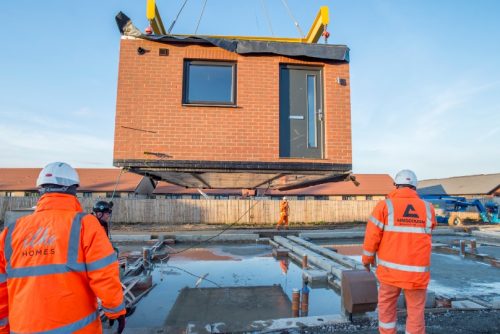The latest views on Modern Methods of Construction (MMC) in residential development

2020 was a year that challenged many areas of the economy. 12 months ago, as the country entered its first national lockdown and the majority of people were told to “stay home” a conversation about what this would mean for the property industry began.
In our latest roundtable with law firm Pinsent Masons, TheBusinessDesk.com took a look at the pandemic’s impact on the housing market, which has remained resilient, in part due to the support of initiatives such as the stamp duty holiday, and in particular the role of modern methods of construction (MMC) and appetite and benefits of utilising the technology.

Gemma Smith, Strata
Gemma Smith, managing director of the Doncaster-based Strata Homes, which is trailing the use of MMC alongside its traditional builds explained: “The Big challenges that we’ve got in the UK at the minute; are firstly the climate crisis which affects absolutely every single industry and every industry needs to be addressing it.
“We’ve also got a productivity issue within house building. The government has set a target of 300,000 new homes per year that are needed to satisfy the demand, we’re only getting about half the way towards this. So, we’ve got to fundamentally change something within the industry, because we’re not going to be able to double the output unless we do something differently.
“And then I think from a community aspect there’s a real challenge in the country at the minute about inequality – whether fuel or digital poverty and our industry has to play a part in addressing that.”
Smith highlighted that these challenges, which are “probably bigger than just the UK” means that “everybody’s coming together and it kind of leads you down the path of MMC and volumetric development”, because this enables you to deliver a better quality and increase the speed of deliverability while also addressing the carbon challenge.

Dave Sheridan, ilke Homes
Dave Sheridan, executive chair of Knaresborough-based ilke Homes, a modular house builder agreed. He explained that for a number of years there has been work going on to promote modern methods of construction (MMC) and that now thanks in part to government support, there is a “warming of attitude” towards it. He shared Smith’s view that there was also a realisation now that “modular has more to offer than just speed”.
Sheridan added that the he’s also seeing opportunities for MMC and modular as a result of the housing market getting busier.
“I do believe that as the housing market has got busy, traditional suppliers, aren’t interested in some of the market space we’re moving in, for example some of the rented schemes and some of the RP [registered providers] are just not as attractive to some of the major house builders.”
It’s clear from both Sheridan and Smith that they see MMC as being a key additive to the residential development mix and this was also echoed by James Espley, director of debt finance at OakNorth Bank. He said “MMC has got a massive part to play going forward in the housing market”, however he caveated, “I think from a funders point of view it is still a fairly new as a concept” and although becoming much more accepted it does bring some “significant challenges from a funding perspective.”

James Espley. director of property and debt finance at OakNorth Bank
Espley outlined that one of the major concerns was the risk to a bank if the manufacturer goes bust. With traditional methods there are plenty of other parties that can come and take over the process, as opposed to a perhaps a modular manufacturer which is more bespoke.
He also explained that OakNorth Bank is looking at ways to mitigate this challenges as it sees the move to MMC “becoming much more widespread” and “we realise the banking world has to move with this and come up with ways to accommodate it”.
With Espley identifying the trend towards MMC and with traditional housebuilders such as Strata Homes and Keepmoat Homes, the latter of which was one of the founders of ilke, embracing these new methods, what are other developers views on it?
Stephen Wightman,UK MMC lad at Faithful+Gould was keen to highlight that MMC is a spectrum of solutions and the issue he sometimes saw was people becoming too “single minded [around MMC] and just looking at volumetric” for instance when SIPs (engineered panels used to construct walls or floors) are also an MMC solution.

James Blakey, Moda Living
James Blakey, planning director at PRS developer Moda Living which currently has about a billion pounds worth of construction on site currently including SoYo in Leeds, explained that they are using the MMC route for certain aspects of its developments such as “bathroom pods, utility rooms and risers” because there are significant advantages from a programming point of view and because of a quality control which benefits from the construction taking place in a much more controlled environment.
He did however say the challenge for MMC for businesses like Moda was that the PRS sector “remains quite a young “, which makes being able to commit to a design on a full modular basis very early on in that process quite challenging.
Looking ahead Blakey stated he feels the business has an appetite to embrace more MMC and possibly more fully fledged modular but at present they’ve implemented it about as far as they can for now. Ultimately, he explains it’s “attractive” but the question comes can the upfront capital costs be recovered through completing the programme quicker – “that’s probably the equation we’re currently looking at.”

David Hogson, CEG
David Hodgson, head of strategic development at CEG which is developing new homes at Kirkstall Forge and also planning to deliver a new scheme in the Southbank of Leeds city centre added that as a business they’re looking “very closely” at MMC.
“The challenge we’ve got at Kirkstall [Forge] in particular is topographically and typology the type of units on there, which we got planning consent for a couple of weeks ago, have got commercial on the ground floor and then a level of car parking because the two estate roads are at slightly different levels as you come down the embankment.”
He added: “I think with all these things if you’re going to factor in MMC, we probably should have designed it as such on day one, rather than trying to retrofit the products that are out there.”
However, Hodgson also picked up on Espley’s previous point noting that they’re seeing an increased focus from funders on sustainability, which could have a bigger impact on the provision of MMC moving forward.
“Our funding mainly comes from Scandinavia and we are setting up a new round of funding to come in to the UK – our fourth round with this partner – and this is the first time where we can present all the documents in the world about IRR and return on costs and that kind of things, but what’s been a key focus [for them] has been ‘what are our sustainability criteria? How do we measure it? What’s our target and where do we envisage being?'”
He explained that despite a decade long relationship with the funders the conversation this time has taken longer because with sustainability comes thoughts on future ownership models, management of buildings and this on all sides could accelerate a range of solutions in residential development including MMC.
Blakey added however it’s not just funders who will drive that acceleration. “We’re an operator and our residents want to see more from an environmental and sustainability point of view.” He went as far to highlight that Moda’s residents have been shown to want to know what the ESG sustainability strategy for the business is.
So if funders and consumers are going to be two of the linchpins in improving sustainability in housing, which would appear to also signify a move and further embracing of MMC, what role does government need to play?

Tom Johnson, Pinsent Masons
Tom Johnson, partner at Pinsent Masons stated: “On the one had we’ve got an MMC Task Force in Wolverhampton, which is great as it’s good to see a focusing of attention. But, the funding that’s gone into that is relatively small in the grand scheme of things and yes Homes England has made some strategic investments as well, but to what extent is government really leading by example?”
Sheridan, responded that he believes the government is “doing a lot, but it’s not doing enough in my opinion.”
He also added that there’s challenges to MMC created by the powerful lobbying voice of the Home Builders Federation (HBF). “They [the HBF] don’t particularly want change at the moment, I think they’re quite comfortable with their model, that works.”

Stephen Wightman, Faithful + Gould
Wightman concurred commenting: “As David says, the status quo is certainly a challenge for housebuilders. I did some work with a couple of UK majors, but all we could get them to do was panelised systems, which removed a small portion of works to factories. They would never take up volumetric because it didn’t suit their business models, or their funding models or their financials.”
Sheridan however added that he believes that the government “not by design” will increase MMC as a result of its agenda around building regulations stating: “I think people will be forced to look down this route [MMC] because using traditional builds to achieve the air tightness and the U values is very difficult.”
On government support Espley added he sees an opportunity for it to do something to make “funders much more comfortable with lending into the sector”.
“Is there not a potential for the government with this MMC task force to actually back the manufacturers and provide some kind of guarantee to the lenders, in terms of the production. This then gets the lenders over a lot of the problems that they have and issues that they have with MMC funding.”

Stephen Glass, Pinsent Masons
Stephen Glass, partner at Pinsent Masons also added surely to drive MMC forward he sees an opportunity for the insurance market.
“Forward funders face the same issues as the banks and in the absence of the government being able to do something major on this, I think the insurance market there has to be a better product out there for some of these risks.”

Jon Riley, Pinsent Masons
Jon Riley, partner at Pinsent Masons mentioned one of the challenges facing all development whether MMC or traditional and that has been promised to be tackled by government lies within planning.
Blakey concurring emphasised the need to ensure proper resourcing: “There are some fantastic people in local authority planning departments working extraordinarily hard under very difficult circumstances. But you can’t get one person to do four people’s jobs, day in day out. So, resourcing is a major step forward, which government has promised repeatedly to do something about but have failed to do so.”
Riley added: “It’s not just those levels [of people resource] available, it’s the education and the messaging around MMC that’s really important so that people in local authorities understand all of the benefits and can make a balanced view and informed policymaking on planning policy, economic policy, housing policy and that’s not just at officer level but also for members.”
Hodgson added to both that the need in planning goes beyond education it is also about “empowerment” of both individuals and local authorities to make decisions.
As the discussion comes to an end what does the future have in store for the housing industry. Smith sums it up: “I think as an industry we’ve probably got a good five to 10 years of sharing knowledge on MMC ahead of us and there’s a real learning from all angles that’s going to happen and it’ll be quite an exciting time.”
Explaining that Strata has already run a trial MMC project and plans to further increase that going forward, while learning from other peers within in the industry in the UK and abroad,
However, looking more widely, she also said that the future for housing will be shaped as Blakey mentioned by the consumer. Her predictions include a rise in smart technology integrated into new homes, a focus on efficiency and sustainability, and a demand for personalisation – an ever increasing consumer trend.








